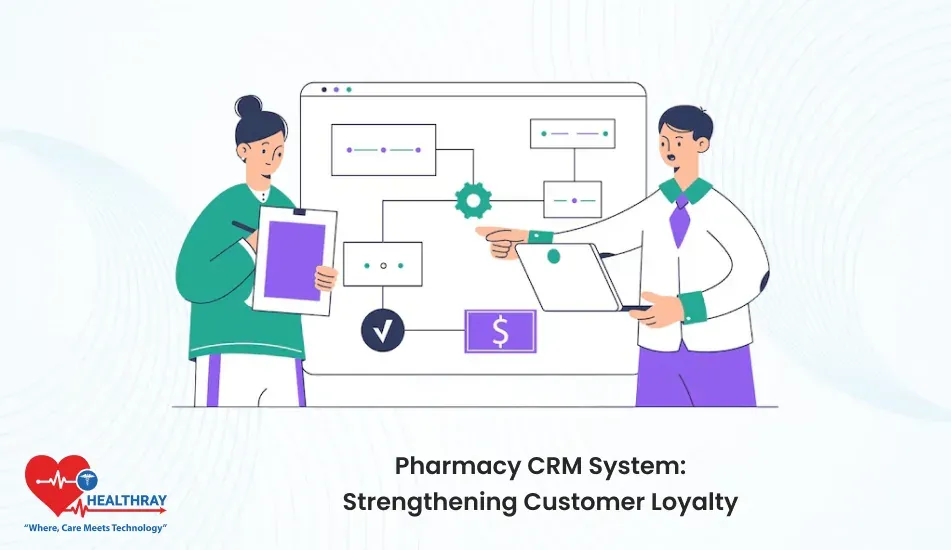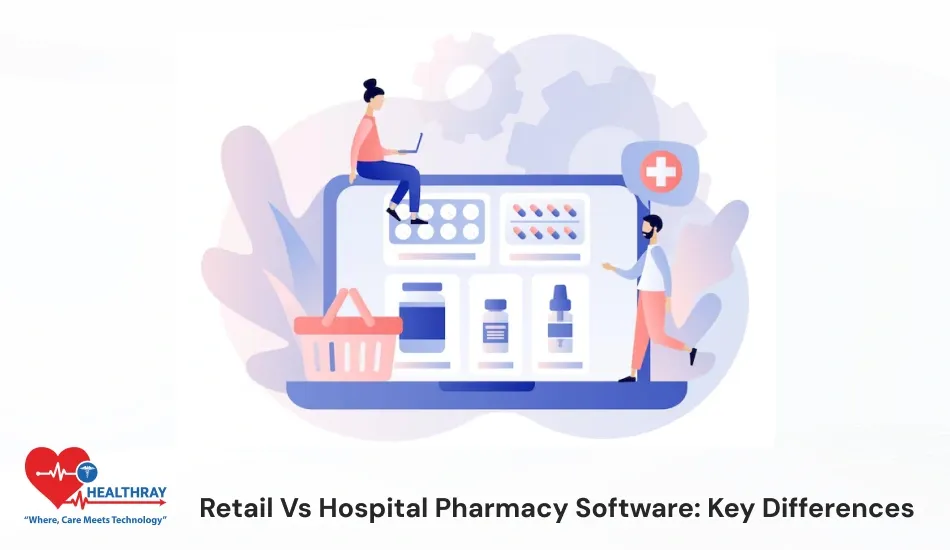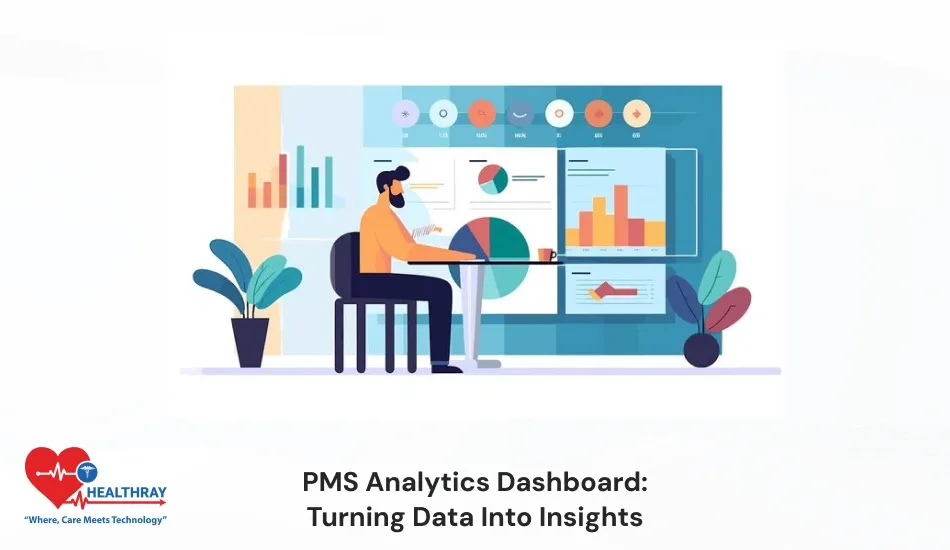Pharmacy Management System services are changing the way healthcare team members work together. These services make it easier for pharmacists, pharmacy owners, and healthcare administrators to communicate and streamline their workflows. For many, the key lies in the integration of pharmacy management systems, which are software solutions designed to manage everything from medication inventory to patient records.
But that doesn’t mean convenience alone. This is the way before working with an ecosystem where pharmacists, physicians, and administrators come together to improve the caring structure spiral, thus making the health dispensary so much more secure, expeditious, and efficient by bringing in some kind of an AI-based pharmacy management system into the mix. In return, these systems can analyze big data, automate monotonous, mundane tasks, and even predict inventory requirements for the future.
You must be curious about how Pharmacy Management System services help enhance collaboration. What is the key distinguishing factor of AI-based systems? Well, let us discuss these two questions and then delve further into all that these tools offer to drive pharmacy success.
What Are Pharmacy Management Services?
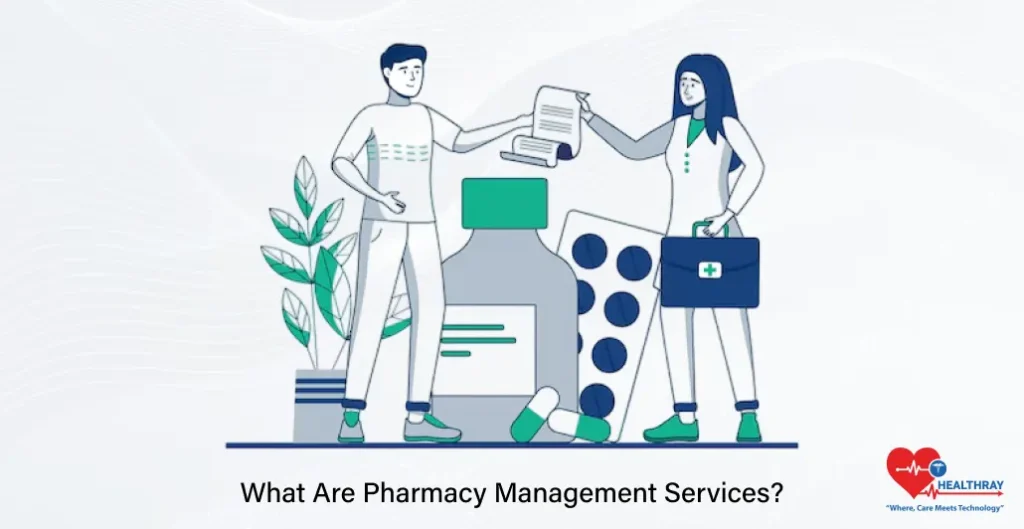
Pharmacy management services are an assortment of solutions intended to support and streamline pharmacy operations. These services, which go toward improved day-to-day operating activities beyond only dispensing medicines, seek to increase efficiency in the totality of pharmacy services while bringing pharmacists, healthcare professionals, and administrators into close association with one another.
Inherent in this support service is the management of critical parameters such as medication inventory, compliance with pertinent laws, patient care, and billing processes. Thus, pharmacy management services are meant to provide all the tools necessary for rewarding pharmacy operations for its patients.
Pharmacy management services often have one critical element in common; such systems come in forms known as pharmacy management systems, software that centralizes all activities. These systems assist in tracking prescriptions, maintaining proper inventory levels, and ensuring patients are provided with the right medications according to the time.
By eliminating the manual process, these services save time for human productivity and reduce errors.
The growth in the need for services like these, on one hand, reveals how indispensable they have become for any pharmacy wanting to make a competitive-brand statement in today’s fast-paced health industry as well as the more integrated ways of providing patient care and having the business succeed; encouraging a sort of patient, physician, and pharmacy teamwork relationship.
Drive Symbiosis into Pharmacy Management Systems
With catalytic integrity, pharmacy management systems have changed teamwork coupled with healthcare practice. The systems are created to give ease of access to recovery needs and, at the same time, facilitate broader collaborations between pharmacists, doctors, and healthcare administrators.
These systems have the capability to perform varied functions, ranging from storing data in one place to creating damage-proof connections within the pharmacy dynamics. For instance, if a universal change is made by some pharmacist to do some patient prescription, the system automatically communicates back with the doctor and everybody else relevant to the patient. It indirectly protects patient risk hence enhanced patient safety while keeping everyone on the same data, at all times, reducing the probability of human errors.
Another feature of enhancing collaboration through these systems is automation of tasks. These tasks involve clinical activities like medication reconciliation, inventory control, and patient recall, all of which software requires. Doctors and IT personnel then have the technicalities at their disposal.
In keeping with the above, artificial intelligence pharmacy management systems take collaboration to a further level. These intelligent systems operate in the same way that is to predict medicine requirements and to manage the supply chains effectively. They also play a paramount role in preventing any potential drug interactions or errors from ever happening; in that way, life is made so much safer, and the workload on healthcare teams is lightened.
When healthcare professionals combine their knowledge and wisdom over different shared tools, the arrangement of the system, in such a way, makes every operation move swiftly. Patients receive quickest service while healthcare teams give no room for unnecessary delays, and pharmacies meet their operational goals.
Upsides of Pharmacy Management Systems
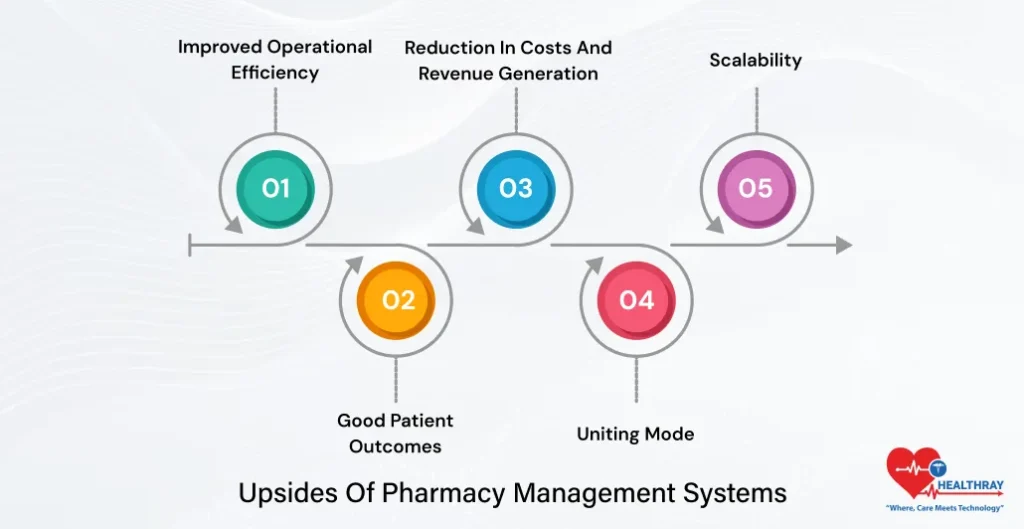
These are beyond mere tools; the use of Pharmacy Management Software is an invaluable commodity for the betterment of the working organization, empowering both dispensaries and healthcare teams. Here are some of their most indispensable advantages for the cause:
Improved Operational Efficiency
These are well-founded and uncomplicated systems: claims. Streamlining cumbersome workflow is believed to be their forte. Management is able to free up time that pharmacists and staff could employ with skill through tackling inventory tracking, prescription filling, and a whole babble that makes up a more or less normal set of routines in a structured practice.
When the amount of stock is low among the 100 various types that have to be checked manually through random checks or counter-bear not acknowledgement or normal inventory count, it is the system that will take care of the problem by some depending on the system notifying the seller about that state and that goods would be available.
Good Patient Outcomes
The centralized medication information made available opens up access to all those who relate to it. The care team is then becoming increasingly capable of making informed decisions right there and then. The pharmacy management system goes ahead to allow for the detection of possible errors such as wrong dosage ingestion or medication interaction-neutralizing potential wrong orders before they ever happen to further enhance what the AI-powered machine system can avail for real-time pharmacy work on the sort of advanced movement analytics.
Reduction in Costs and Revenue Generation
The smart system is going to permit management of supply with better control in tackling the waste. These systems will scope many inbuilt predictive instruments for keeping a personal taxonomy about trend calculation for the timely availability of medications all the time. Secondly, this will be effective from the financial point of view with well-streamlined and well-reimbursed methodologies for possible revenue, hence really set to keep soaring operational improvements.
Uniting Mode
The pharmacy management bunch Sum contributed to better relationships between teams; together, progress updates have been shared with the physician, rapid access to patient records, and better relations. Well, data is flowing fluidly cutting out miscommunication, and fast-tracking patient care.
Scalability
As pharmacies increase their footprint or come across new challenges, these systems scale with them. Pharmacy Management Systems can manage this complexity without adding a further burden upon management at a single site or multiple locations.
The system, with its demerits, thus attractively goes as the most vital aspect of investments in pharmacies and healthcare teams that can take care of intended services in efficient and cost-effective means.
The Role of AI in Pharmacy Management Systems
It is precise and efficient in introducing AI operations, bringing about a paradigmatic shift from how things were done within the pharmacy before. The highest focal point of all pharmacy management systems is in AI, which is mainly tailored to delivering health care services.
Predictive Analytics for Inventory Management
AIs analyze historical data, environmental trends, and demand to plan inventory needs so that forecasting overstocking or medication shortages much more time-efficiently serves as an adjunct to retail pharmacy management systems e.g. it might sense the increased demand for cold medications as flu season approaches and increase orders accordingly.
Error Detection and Prevention
AI’s core contribution to good practice is that it can avoid unnecessary harm before it actually occurs. These systems can view prescriptions and patient documentation to find accidental drug interactions, wrong dosage prescriptions, or duplicative drugs listed. Damage reduction is expected on patients, with much greater liability protection for pharmacies.
Automate Administrative Tasks
Manual and routine tasks, like updating patients’ files, generating reports, sending reminders for refills, and so on, can easily be automated through the use of AI, thereby enabling pharmacists and other employees to spend more time taking care of patients and engaging in more complex clinical practices.
Personalized Patient Care
AI-enabled systems analyze patient data to offer tailored recommendations to personalize treatment. This might include alternative medication suggestions for allergic patients or adherence reminders to chronic treatment patients. Thus improving overall patient satisfaction and health outcomes.
Advanced Analysis for Decision Support
Beyond everyday operations, AI extracts insights for decision-making in the long-term. AI enables pharmacy owners and administrators to define actionable insights ranging from prescription trends to financial insight analysis.
Seamless integration with other systems
Pharmacy management systems, which are AI-based, easily integrate with electronic health records (EHRs) and other healthcare systems. It guarantees because all the team members-from doctors to pharmacists-have the most current information.
AI-based pharmacy management systems can boost operational efficiency as well as limit errors and streamline the overall quality of care provided by pharmacies. It’s no longer just administering drugs but rather leveraging technology to reinvent the whole pharmacy experience.
How To Select The Right Pharmacy Management System?
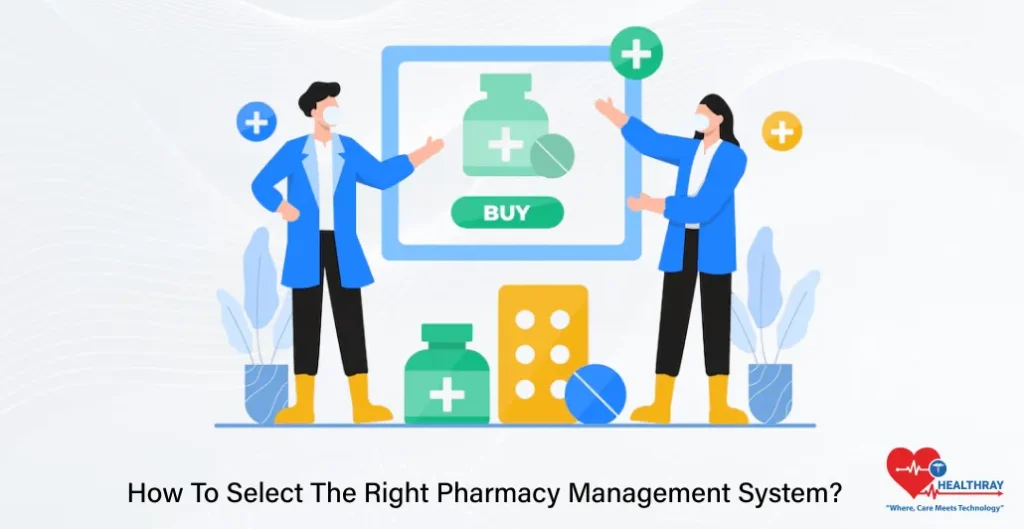
Identifying the appropriate pharmacy management system becomes an important avenue for the pharmacy that desires to promote collaboration and efficiency improvement. With such a wide array of options available in the system market, identification of the most important features and other determining factors must be based on needs particular to the pharmacy.
Integration Capabilities
Integration, which has been perceived as seamless, should be with other working tools, such as electronic health records (EHRs), billing platforms, and other health-related applications. Thus ensuring seamless flow of information across systems, facilitating cohesion within systems and reducing manual entry errors.
AI-Driven Features
AI systems will automate complex tasks and lay the groundwork for earning insight. Predictive analytics for inventory management, error detection, and patient-tailored recommendations are some features that distinguish AI-based systems from traditional pharmacy management systems.
User-Friendly Interface
For adoption, user-friendliness is necessary. A system with an easy interface will reduce the staff’s learning curve so that they concentrate on providing patient care rather than wasting time struggling with complicated software.
Scalability and Customization
Select a system that grows along with your business. Whether you are expanding your pharmacy or adding new services, the software has to allow for easy alterations. Customization options are also important to meet your unique workflow needs.
Compliance and Security
Because health care data are highly sensitive, the system must comply with regulations like HIPAA and the utmost importance must be given to security features like encryption and secure data storage. This way, your patients and your business are both protected.
Comprehensive Reporting Tools
Strong reporting will allow you to monitor all KPIs, financial information, and patient care outcomes. Those insights are instrumental in making sound judgments and discovering opportunities for improvements.
Vendor Support and Training
The right vendor would provide various levels of support, including vendor support, frequent upgrades, and training for your team. This ensures that you are exploiting the fullest potential of the system and remaining updated about recent advancements.
By concentrating on these matters, you will be able to select a pharmacy management system that meets your current needs while facilitating long-term growth and success.
Conclusion
The advent of pharmacy management systems, which support the collaboration of the employees towards the success of modern pharmacies, have thus become indispensable. These systems further streamline operations, minimize errors, and uphold intra-healthcare communication. The entry of AI-based pharmacy management systems has enhanced the scope of this technology, which focuses more on predictive analytics, automation, and personalized patient care.
With the advent of these solutions, pharmacists could spend more time on patient care; this enables pharmacy owners to further enhance their operational efficacy or status for better outcomes throughout the healthcare creation. Making the right investment in a hospital management system is not an option for efficiency but a better option for altering the working of pharmacies in an ever-evolving field of healthcare.
Whether you need a newer technology interface or to further develop an already existing process, pharmacy management services offer the tools and insights to help you forge ahead. Making that first step into collaboration and success begins with an appropriate system that is custom designed for your needs.


